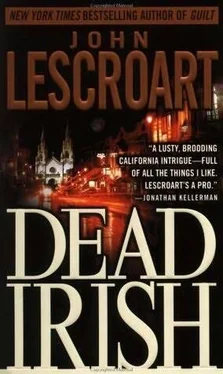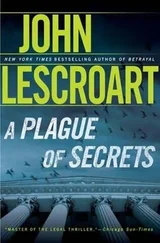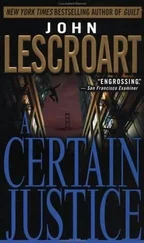John Lescroart - Dead Irish
Здесь есть возможность читать онлайн «John Lescroart - Dead Irish» весь текст электронной книги совершенно бесплатно (целиком полную версию без сокращений). В некоторых случаях можно слушать аудио, скачать через торрент в формате fb2 и присутствует краткое содержание. Жанр: Триллер, на английском языке. Описание произведения, (предисловие) а так же отзывы посетителей доступны на портале библиотеки ЛибКат.
- Название:Dead Irish
- Автор:
- Жанр:
- Год:неизвестен
- ISBN:нет данных
- Рейтинг книги:4 / 5. Голосов: 1
-
Избранное:Добавить в избранное
- Отзывы:
-
Ваша оценка:
- 80
- 1
- 2
- 3
- 4
- 5
Dead Irish: краткое содержание, описание и аннотация
Предлагаем к чтению аннотацию, описание, краткое содержание или предисловие (зависит от того, что написал сам автор книги «Dead Irish»). Если вы не нашли необходимую информацию о книге — напишите в комментариях, мы постараемся отыскать её.
Dead Irish — читать онлайн бесплатно полную книгу (весь текст) целиком
Ниже представлен текст книги, разбитый по страницам. Система сохранения места последней прочитанной страницы, позволяет с удобством читать онлайн бесплатно книгу «Dead Irish», без необходимости каждый раз заново искать на чём Вы остановились. Поставьте закладку, и сможете в любой момент перейти на страницу, на которой закончили чтение.
Интервал:
Закладка:
Almost nothing. It had been the most superficial of meetings- if he hadn’t lied about Eddie, Hardy would never have thought of him again.
He went over everything they’d said. First, the kid who’d freely admitted he knew Eddie. But then Cruz had gotten rid of him pronto. Then there was the vandalism with the fence, which had apparently caught Cruz by surprise. Hardy remembered him standing at the fence after he’d gone to his car, just staring at it, hands on hips, shaking his head. Kids must have done it, he’d said, but again Hardy came up with a question: What kids?
And what about the car Eddie had driven to the lot? Had the department checked it out for prints? Hairs? Fabrics? Had Griffin? Maybe it was still in the city garage.
He got up and went to the bar. Lynne gave him a pen and some paper and he scribbled a few notes while he waited for the next Guinness to settle out.
He looked at his watch. It was nearly six o’clock. He’d put it off long enough, getting out of the house early to walk Orville. Maybe that’s why he’d said yes to Pico this time, without even thinking about it too much.
He asked Lynne to hand him the phone over the bar, dialed information, got the number and called it. She answered on the first ring.
“Please don’t hang up,” he said.
A long silence, then: “Why not?” she asked.
He struggled through an explanation.
“I don’t know why,” she said when he’d finished, “but that upset me more than I can remember.” He sat biting his lip, not knowing what to say, hoping she’d stay on the line. “I thought you were just getting back into character, running away,” she said.
“I’m not doing that anymore.” He’d let her get her jabs in-he owed her at least that much. “I called now, didn’t I? We’re talking.”
“Please, Dismas, don’t do this if you just can’t. I don’t think I could take it.”
He thought about it long enough that she repeated his name.
“Okay,” he said.
“Okay what?”
“How about we try again tonight. I swear to God I’ll show up.”
“Why don’t you give me your phone number? That way if you don’t, I can do something about it.”
“You got a pencil?”
They went to a place on upper Fillmore that specialized in Cajun food. They sat in a booth, next to one another on a bench as though they expected another couple. A maroon cloth was pulled across the front of the booth between visits from the waiter. Jane sat closest to the wall, Hardy on the outside.
They had oysters with Cajun martinis while Hardy talked in a little more detail about the events of the day before. For entrées, Jane ordered catfish cut into strips and tossed with peppers, onions and baby shrimp. Hardy had a blackened filet, extra rare, with a tamale. They shared a bottle of white wine and found out a little more about each other.
When she and Hardy had been together, Jane had worked in the advertising department at I. Magnin, but after a couple of years had become more fascinated, she said, with the fashions than with the actual selling of them. She had become a buyer, starting over from the bottom, and liked it now very much, traveling to New York, Los Angeles, Chicago, even to Europe and twice to Hong Kong.
Hardy regaled her with tales of bartending, Moses, Pico and his sharks, a little about Eddie Cochran. Their desserts arrived- a couple of crème brûlées and some espresso. The talk wore down. Hardy looked at his watch. Jane half-turned on the bench to face him. She reached out and covered his near hand with hers. “Do you think,” she asked, “it’s time we talk about Michael?”
Hardy looked straight ahead, across the booth, at the knotholes in the redwood-stained plywood. He lifted his espresso cup, then put it down without drinking. He moved his hand out from under hers.
“Don’t,” she said.
“I’m not doing anything.”
“You’re pulling away from me again.”
Hardy, trapped in the booth, said, “Maybe I am.”
Jane again reached for his hand, putting it, as she had the other night, in her lap. She kneaded it slowly with both of hers. “Because what’s the point now? Is all this just social talking, catching up on each other?”
“All what?”
“Dinner. Clever repartee.”
“Come on, Jane.”
“You come on,” but gently. “Knowing what somebody’s doing isn’t knowing them.”
“Maybe it’s enough.”
“Well, then I wish you hadn’t called me.” She let go of Hardy’s hand with one of hers and quickly, with her index finger, wiped a tear from each eye, one after the other. “It wasn’t your fault, you know.”
Hardy was a block of carved wood, unyielding, inert.
“Have you ever talked about it?” She held his hand in hers again. A couple of tears had overflowed onto her cheeks, but she wasn’t sobbing. “Do you ever think about it even?”
“I never don’t think about it.” But then, as quickly as it had come, it was gone. “It doesn’t matter,” he said, “I’m sorry I yelled at you.”
“It doesn’t matter?” she asked quietly. “You think yelling at me is the problem? I’d rather have you yell at me any day than just disappear.”
He barely trusted himself to breathe. “It won’t bring him back.” Hardy finally looked at her. Seeing the tears, he brushed Jane’s cheeks, turning on the bench to face her. “You didn’t kill him, Jane. I did.”
“You didn’t. He’d never stood up before. How could you have known?”
“I should have known.”
Michael, the seven-month-old son, had stood up for the very first time in his crib. Dismas had put him down for the night with the sides lowered. The baby got to his feet, leaned over, and fell to the floor, head first. He had died by noon of the next day.
“I should have known,” he repeated.
“Dismas,” she said, “you didn’t know. That’s over. It’s long over. How long are you going to suffer for it? It was an accident. Accidents happen. It just wasn’t anybody’s fault.”
He picked up his coffee cup, staring across the enclosed space, and put it to his mouth, tasting nothing.
“Every time I looked at you I blamed myself again. What I put you through. Me and you.”
“You didn’t put me through it. You didn’t cause it. Look at me now,” she said.
She was beautiful to him. Her cheeks glistened with her tears. “I’m telling you I never thought it was you. It might as easily have been me. I should have known, too. All the books said he was getting ready to stand up, and I never thought of it.” She brought his hand to her lips and kissed it. “The worst was losing you both.”
“I couldn’t face you.”
“I know.”
“And everything else just seemed, still seems”-he shook his head-“I don’t know… it stopped meaning anything.”
“Me, too?”
He closed his eyes, perhaps visualizing something, perhaps remembering. “No, you meant something. You’ve always meant something.” He hesitated. “All the other stuff… I couldn’t work up any interest.”
They sat facing each other, turned together on the bench in the Cajun restaurant. They held each other’s hands, both of them, between themselves.
“When you called me from in the bar, on the phone,” Jane began, “you said you weren’t running anymore.”
He nodded.
“You want to think about that?”
He nodded again.
There wasn’t anything else to say. He let go of her hands and pushed the button at the side of the booth, signaling the waiter to come and give them the check.
Glitsky’s voice had said to call no matter what time Hardy got home.
After leaving Jane, his mind a jumble, he had driven back down to China Basin to view the Cruz parking lot another time. He walked to the hole in the fence, now inexpertly patched with baling wire. The cyclone fence hadn’t been pulled away by kids. It had been cleanly cut top to bottom.
Читать дальшеИнтервал:
Закладка:
Похожие книги на «Dead Irish»
Представляем Вашему вниманию похожие книги на «Dead Irish» списком для выбора. Мы отобрали схожую по названию и смыслу литературу в надежде предоставить читателям больше вариантов отыскать новые, интересные, ещё непрочитанные произведения.
Обсуждение, отзывы о книге «Dead Irish» и просто собственные мнения читателей. Оставьте ваши комментарии, напишите, что Вы думаете о произведении, его смысле или главных героях. Укажите что конкретно понравилось, а что нет, и почему Вы так считаете.












